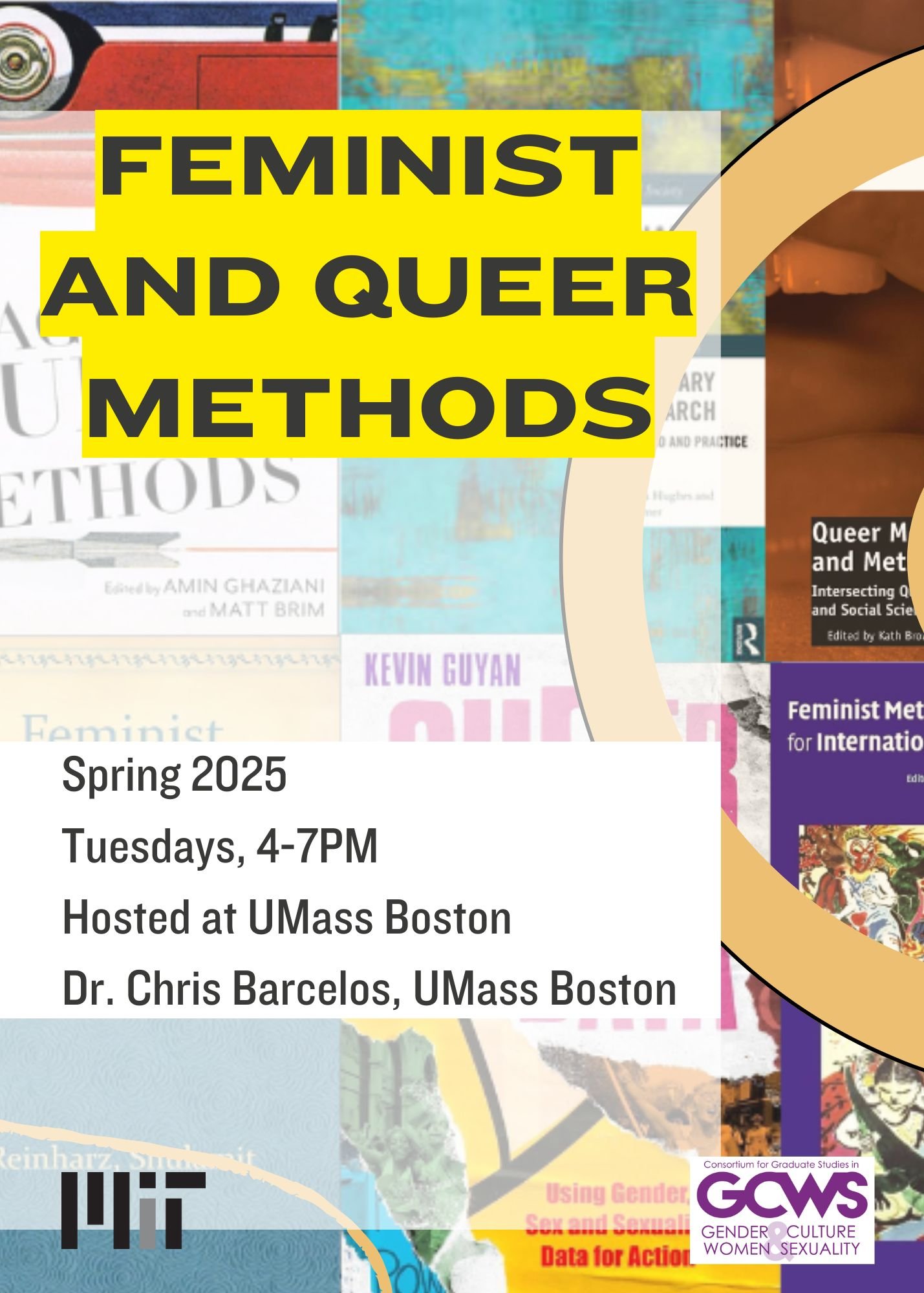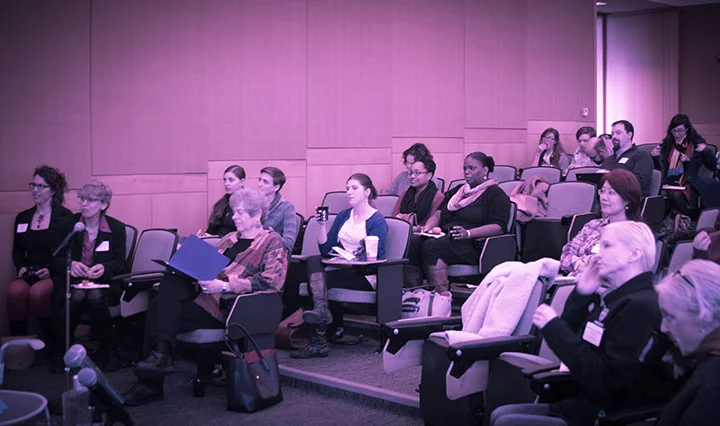Teach a Course
Teach new and ground-breaking courses with GCWS
Proposing a course to the GCWS
The Graduate Consortium for Gender, Culture, Women, and Sexuality is seeking proposals for our core courses (Workshop for Dissertation Writers in Women’s and Gender Studies, Feminist and Queer Theories, and Feminist and Queer Methods) in addition to rotating elective courses.
We are particularly interested in offering courses that incorporate queer theory, transgender theory, post-colonial studies, Indigenous studies, critical race theory, and other disciplines that are often marginalized by university systems. It is one of our main goals to offer courses that extend and enhance what is available to graduate students enrolled at member institutions and provide faculty with a unique opportunity for professional growth.
When designing courses, faculty should keep the following goals in mind:
Explicit consideration of how interdisciplinary inquiry puts pressure on what counts as knowledge in individual disciplinary orientations;
Systematic attention to intersections of race, class, and culture with gender as categories of analysis;
Social and cross-cultural dimensions that ground both the concrete issues and the theory addressed in the course; and
Attention to the implications of theory, practice, and/or policy implications of the material. In addition, courses should be designed to explore disciplinary and/or methodological conditions of knowledge.
Previous courses have included:
““The experience, despite being on zoom, surpassed my expectations. The students were engaged and committed to the class throughout the course of the semester. I learned, too, from my co-instructor and I believe that we worked together quite seamlessly throughout the semester to create a fruitful class experience.” ”
““This seminar was a blast! We taught the seminar 2 years ago so we received useful positive feedback from the GCWS to improve some aspects on the syllabus. The program manager did an outstanding job helping us navigate the remote class experience. I’d love to teach the course again anytime soon!””
Course Information
GCWS courses incorporate 13-15 weeks of instruction. The fall semester runs the Wednesday after Labor Day through the first week of December. The spring semester runs from the last week in January until the first week in May. The teaching faculty have full autonomy to select the day and time for the course. Courses can be offered on the MIT campus, hybrid, or at the faculty’s home institution.
Core courses
Our core courses are taught by one instructor and they include:
Workshop for Dissertation Writers in Women’s and Gender Studies (a full year course that meets every other week)
Feminist and Queer Theories (offered in fall semester)
Feminist and Queer Methods (offered in spring semester)
topic Based courses
Our rotating topic courses (up to three per year) can be solo- or team-taught with faculty from different disciplines and institutions.
Download previous course syllabi
Faculty are encouraged to be innovative, creative, and bold in their course topic selection, syllabus design, and pedagogical practices. Previous syllabi for our core and topic based courses can be found in this Google Folder. All syllabi are reviewed with this rubric. If you want additional examples of syllabi or have questions, please contact the GCWS Program Manager.
Eligibility & Compensation
Tenured, tenure track, lecturers, and Emerita faculty from our member institutions can teach for the GCWS. At minimum, syllabi must be approved in the academic year prior to being taught (for example, a course offered in Fall 2026 or Spring 2027 would need to be approved during 2025-2026). Faculty leading the Dissertation Workshop should have substantial experience working with PhD students.
The GCWS has a memorandum of understanding with the Provost of each member institution. Faculty can be compensated in a number of ways depending on their status:
Tenure and tenure track faculty, of any discipline, can teach for the GCWS as part of their standard teaching load at their home institution. The GCWS Program Manager and board representative from your institution can provide additional information and support throughout this process.
Tenure and tenure track faculty can teach a GCWS course in addition to their standard course load at their home institution. In this situation, faculty will be hired as a lecturer at MIT and paid by GCWS. As of 2023, the MIT lecturer rate ranges between $11,500 and $13,900 per course (determined by number of relevant teaching years).
Lecturers from member institutions will be hired as a lecturer at MIT and paid by GCWS. As of 2023, the MIT lecturer rate ranges between $11,500 and $13,900 per course (determined by number of relevant teaching years).
Teaching Teams
GCWS topic based courses can be team-taught by faculty in different disciplines and at different institutions. You do not need to have a co-instructor in order to propose a course idea. The GCWS Program Office and Board routinely assist in creating teaching teams. Faculty teams are created in a number of ways:
Through personal contacts between faculty members or conversations that occur at GCWS events;
With the assistance of and targeted outreach by the GCWS Program Manager and/or Board of Directors;
By responding to a GCWS calls for course proposals and being matched with another faculty member interested in the same topic;
Making connections via the GCWS Faculty Database
““I will definitely teach with GCWS again. From interacting with my co-instructor and our students, I have come to consolidate my belief in team teaching (across disciplines and socio-cultural backgrounds) as a framework for stimulating intellectual curiosity and global awareness, as well as a sanctuary to hone feminist pedagogies that students may transfer to serve their teaching.””
Proposal Process
The proposal process is a unique experience for each course that is proposed and taught. Whether you have taught for the Consortium before, are new to teaching for the Consortium and want to teach solo or with a partner, will all impact how the proposal process looks. Below is a general outline of the steps and what to expect. The GCWS Program Manager is available for consultation at any step during this process. The exact timeline and due dates will be determined by board meeting schedule and desired semester of instruction.
Contact the GCWS and express interest in teaching a course. You can contact the GCWS Program Manager, the board member for your institution, or submit a course interest form. At this step, you do not need to have an established course idea, or a co-instructor if you want to team teach. The GCWS Program Manager will be in touch to discuss courses that are in the incubator, your background, any course ideas you may have, and for those who want to team-teach, what you are looking for in a co-instructor.
Create and submit your course proposal for review by the GCWS Board of Representatives. The Board evaluates course proposals based on its connection to our mission, other courses that are being offered, relevancy to WGSS, and other factors. A course proposal should include:
Course title, description, and objectives
Outline with major themes, topics, and a list of resources that will be used in the syllabus (books, articles, media, etc)
How the course meets GCWS mission, curricular needs, and initiatives
CV for each instructor
1-2 paragraphs about how you imagine your teaching relationships with students
Proposed semester and year and how many stipend will be requested (if known)
For team-teaching only: Connect with your co-instructor. If you need assistance, the board can connect you with faculty who might be interested in teaching with you.
It is time to craft the syllabus! If you are working with a co-instructor, it is critical to collaborate and incorporate your disciplines and pedagogical methods when creating the syllabus. All syllabi proposed to the GCWS must incorporate a feminist and WGSS framework. Syllabi should also incorporate analyses on race, class, ethnicity, disability, and more.
Submit your syllabus. The first draft will be reviewed by the GCWS Board and feedback will be offered based on this rubric.
Submit your revised syllabus incorporating the suggestions that best fit your vision for the course. The revision process is intended to be a dialogue between the teaching team and GCWS board.
Once your syllabus is approved, the GCWS Program Manager will issue confirmation letters for the semester and year that the class will be held. Minor adjustments can be made after it has been approved, particularly if new or additional resources become available. Major changes need to be approved by the board.

















